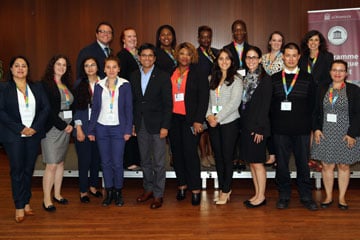Kayla Cardinal Lafrance found it easy to make the choice to register for the University of Ottawa’s French Law Practice Program. She wanted to focus on her studies first then figure out which area she’d like to specialize in.

“It was really hard to determine what I liked, I kind of liked everything,” she says. “I didn’t cater my whole law school experience to one field.”
The University of Ottawa’s Law Practice Program, in French the PPD, “Programme de pratique du droit,” was designed to “promote access to justice for Francophones" and as an alternative to traditional articling. The program is only offered in French.
“We have a lot of academic knowledge coming out of university but nobody really asked us to do anything concrete,” says Cardinal Lafrance.
The candidates do different mock experiences — one week it’s working as a criminal lawyer, the next it’s tackling a leasing problem.
“I honestly think it's the best decision I made since I started law school,” Cardinal Lafrance says. In January, she will be starting a position in-house at the Bank of Canada.
To prepare them for work beyond the program, candidates also learn how to manage a practice, doing physical filing, digital filing and billing clients.
“We even get pretend cheques, the whole thing,” she says. “Maybe something we could do is get on board with the future and try to go paperless, but honestly in the beginning it’s good to do the paperwork to see how much better it would be if we could digitize the whole process.”
This year there are 12 candidates in the program. Last year there were 25.
“I really like the vibe that we have because we’re smaller,” says Cardinal Lafrance. To her this means that she gets a very personalized experience.
Anne Levesque, the program director, wrote in an email that one factor impacting enrolment was the report the LSUC initially released last fall saying it would cut the program, before reversing the decision. As a result, many candidates found articling positions instead.
“However, since the beginning of the program not once has a candidate stated that the program’s reputation was a factor in selecting articling over the LPP. Rather, all candidates (even those who have withdrawn) say we have an outstanding reputation,” Levesque wrote. “It is not at all viewed as a backup plan or a second class path to the profession.”
Andréanne Charron decided on the LPP because she knew what area of law she wanted to specialize in.
“I didn’t see the point of, for example doing my articling in business law, when I wanted to go into social justice,” she says.
Charron landed a placement at the legal clinic in Cornwall and she was hired back upon completion.
She found that the in-class portion of the program helped her a lot. “It was very personal,” she says. “The lawyers that were teaching us, we know their names. We know our teams. For me it helps with the community feeling, having everyone together.”
Community, she says, is also an important part of networking.
“Someone knows someone and then you find out that this person knows 10 other people, it just seems that the French legal community is even smaller than you think because everyone knows everyone.”
The candidates are also encouraged to go to every networking event, Charron says, they’re not just limited to French events.
She also credits the program with making the candidates aware of the difficulties that francophone communities face, such as accessing justice in French, and encouraging them to be involved in their communities all the time.
For Access to Justice Week the candidates have been separated into teams and have been assigned a region of Ontario to conduct research on issues and barriers to accessing justice in French. The teams, working closely with l’Association des juristes d’expression française de l’Ontario and the Centre d’information juridique d’Ottawa, connected with a lawyer working in their region and asked to interview that person on the issues.
Cardinal Lafrance is presenting at the event on Hamilton.
“They’re like our lawyer-mentor for the region to give us the low-down for what works here, what doesn’t, what needs improving, maybe you should talk to this person and this person,” she says.
Cardinal Lafrance says it’s been easy to make connections.
“The perception of the [program] within the legal community is very well received, we make ourselves known,” Cardinal Lafrance says. “We have a lot of networking opportunities so it’s not just a way to access the profession but a way to get integrated into the profession.”










